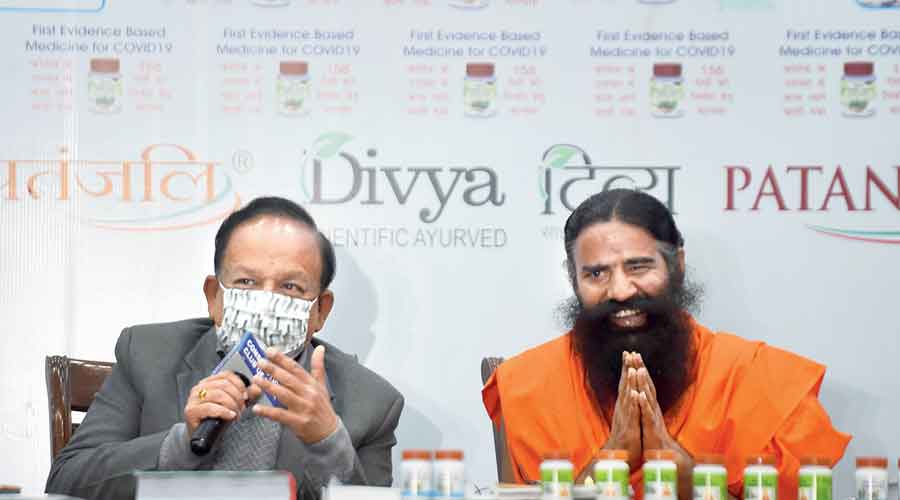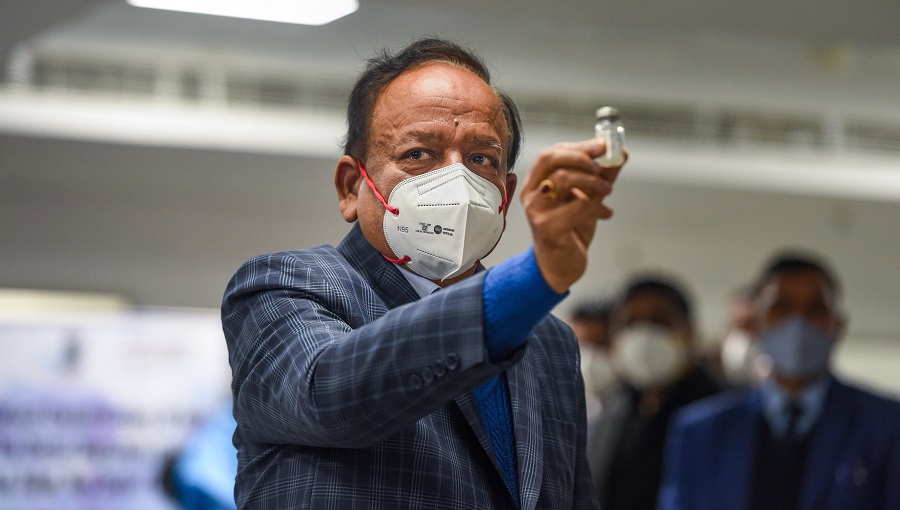Sections of doctors have questioned the ethics and propriety of Union health minister Harsh Vardhan’s decision to present himself alongside Ramdev at an event associated with a herbal cocktail touted as an anti-Covid-19 medication.
The Union minister later suggested that the government and the yoga evangelist had shared dreams regarding ayurveda.
Some doctors said the minister’s presence at a programme on Friday to mark a scientific paper on the herbal product called Coronil and his tweets later were tantamount to endorsing the product that they say remains to be rigorously assessed.
Harsh Vardhan had tweeted: “Pleased to have joined my colleague, minister of road transport and highways Nitin Gadkariji, and Yogishri Ramdevji at the event marking release of scientific research paper on the first evidence-based medicine for Covid-19 developed by Patanjali.”
Ramdev is the public face of Patanjali Ayurved, the company that sells Coronil — a cocktail of three herbal products and a herbal-mineral formulation.
“Regarding Ayurveda, whatever dream Baba Ramdev has, that is the government’s dream,” Harsh Vardhan tweeted after the event during which the minister said that if ayurveda proves itself during Covid-19, it would not need any “bigger certificate”.
The Union health ministry did not respond to an email from this newspaper seeking Harsh Vardhan’s response to the criticism. Patanjali could not be contacted for comment, either. Both responses will be published if and when they are issued.
While the reliability of the herbal cocktail remains a question for science, some doctors have raised the ethical issue of whether a minister — particularly the health minister — should have directly associated himself with such an event freighted with potential conflict of interest.
Medical researchers within and outside India have also raised questions about the scientific paper that describes a clinical trial on 100 patients with mild Covid-19, half of whom received Coronil and the other half received a placebo or sham medication. Doctors at the private medical college in Jaipur who conducted the trial published the paper in a peer-reviewed journal named Phytomedicine.
Edzard Ernst, emeritus professor of complementary medicine at the University of Exeter in the UK, posted a blog on Saturday flagging inconsistencies in the paper — at one point it claims the patients had no symptoms whereas at another point it says they were “mildly symptomatic”.
“Some of the effect sizes reported are extraordinary and seem almost too good to be true,” Ernst wrote.
The paper has reported that 100 per cent of the treatment group had recovered by day 7 compared with 60 per cent of the placebo group. Inflammatory markers were also 2.5 to 20 times lower in the treatment group than in the placebo group by day 7.
“The rush to get the above out heavily endorsed by ministers sounds like drug company blurb and is science free promotional guff,” John Travis, a US-based complementary medicine specialist wrote, responding on Ernst’s blog page, also on Saturday.
Several doctors in India have also questioned the paper’s content. Public health physician J.N. Rao, responding to Ernst’s blog, wrote the scientific paper was “replete with flaws”. Other doctors have also cautioned people about its content.
“If we endorse a medicine based on seriously unsound research, we are harming both science and people,” said Shriprakash Kalantri, professor of medicine at the Mahatma Gandhi Institute of Medical Sciences, Wardha.
Kalantri said the clinical trial conducted in Jaipur and the scientific paper were marked by “inappropriate design, unrepresentative sample, a flawed method of analysis, and a faulty interpretation”.
Om Lakhani, an Ahmedabad-based endocrinologist, posted several tweets, asking Harsh Vardhan whether the minister was not “promoting pseudoscience”.
Rao has underscored his concern about what he calls “lead time bias”.
Since the patients enrolled in the trial were largely asymptomatic, Rao said, to count the time for viral clearance (negative test) from the day of testing is to ignore how long before the day of testing the patient might have become infected.
“If this lead time (had) differed systematically between the treatment and placebo groups, the conclusion would be biased,” Rao said.
He said the raw data on the inflammatory markers in the two groups of patients suggested they had acquired the infections at different times, which could explain the faster recovery of the treatment group compared with the placebo group.












